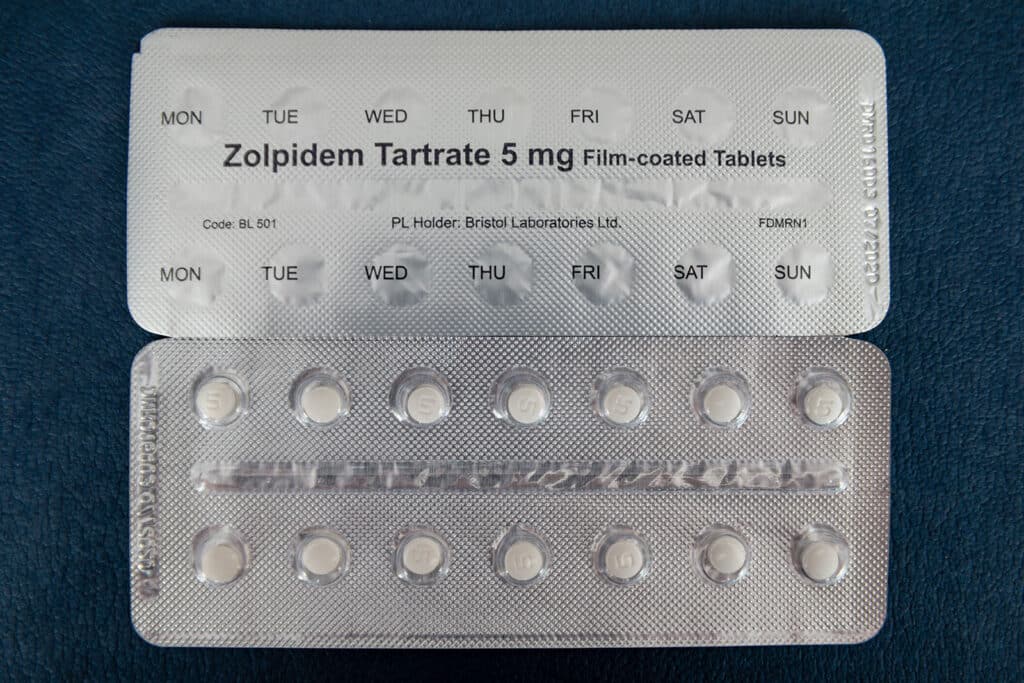Did you know that up to 30% of adults worldwide suffer from acute or chronic insomnia? Many people are constantly searching for solutions to their sleep struggles. These solutions include sleep aid drugs such as Trazodone and Ambien.
Trazodone is a generic FDA-approved anti-depressant that’s commonly used as a sleep aid. On the other hand, Ambien is a brand name for the sedative-hypnotic drug, zolpidem. Both options are controlled substances that should only be used under a doctor’s supervision.
Read on to learn more about the way each of these drugs works. You’ll also find a detailed account of both drugs’ side effects and potential for addiction.
Table of Contents
What Is Trazodone?
Trazodone is an FDA-approved medication designed to treat depression. It helps improve patients’ appetite, temperament, and energy levels.
This drug is also commonly used as a sleep aid. It’s known to treat insomnia and anxiety caused by depression.
The term Trazodone refers to the generic drug itself. It’s available under different brand names, such as Oleptro.
How Does Trazodone Work?
Trazodone has its effect as a result of its action of restoring the balance of serotonin in a person’s brain.
Serotonin is a neurotransmitter that acts as a messenger between your brain cells. It has a wide range of effects on your physical and mental well-being. Your appetite, mood, thought patterns, and ability to sleep all depend on your serotonin levels.
When taken in lower doses, Trazodone makes patients feel drowsy and relaxed. It inhibits the potency of the chemicals in your brain that can dampen the effect of serotonin. It also helps regulate other neurotransmitters, such as H1 histamine receptors.

What Is Ambien?
Ambien is a brand that produces zolpidem, a sleep aid used by millions of people. This drug is usually considered a temporary solution for those with severe insomnia.
Prolonged use of this sedative-hypnotic substance can lead to physical dependence and addiction, which we will discuss in depth later in this guide.
When used correctly, Ambien can lead patients to fall asleep easier and improve their overall sleep quality.
How Does Ambien Work?
Ambien produces a calming effect by working on your brain.
It does so by increasing the activity of GABA (gamma-aminobutyric acid). This chemical is a neurotransmitter that operates in the brain and the spinal cord. In turn, it reduces the activity of the central nervous system and makes it easier for you to sleep.
Additionally, Ambien is a fast-release drug. This means it doesn’t take much time for it to get into your bloodstream and start having the desired effect. The advantage behind this is that the dosage required for Ambien to sedate a person is low.
You should also note that there are versions of Ambien designed to operate slower, and in turn, stay in your body longer. Doctors will prescribe this version to those who have no issues falling asleep but tend to wake up mid-sleep and have trouble going to sleep again.
Risks and Side Effects
If you’re going to use Trazodone or Ambien, it’s essential to be fully aware of the risks and side effects involved.
These are drugs after all, and using them incorrectly can have disastrous detrimental effects on your well-being.
Here’s a list of the side effects of Trazodone and Ambien, respectively:
Trazodone
- Diarrhea
- Nausea
- Nervousness
- Dizziness
- Reduced appetite
- Vomiting
- Constipation
- Feeling weak and tired
- Muscle pain
- Rash
- Stuffy nose
- Redness and irritation of the eyes
- Uncontrollable shaking
- Dry mouth
- Lower libido and dysfunction of sexual organs
- Nightmares
Trazodone can also have severe side effects that require immediate emergency medical treatment. They include:
- Loss of consciousness
- Seizures
- Chest pain
- Difficulty breathing
- Nosebleeds
- Severe headaches
- Prolonged erection (more than 6 hours)
- Red or purple skin discolorations
- Loss of coordination
- Unexplained bleeding or bruising
That being said, don’t under any circumstances use Trazodone without first consulting your doctor. Make sure to disclose all other medications you’re currently taking to ensure that it’s safe to take Trazodone with them.

Ambien
- Fatigue
- Headache
- Lack of balance
- Constipation
- Nausea
- Heartburn
- Reduced appetite
- Stomach pain
- Uncontrollable shaking
- Numbness or tingling of extremities
- Dry mouth or throat
- Redness and irritation of the eyes
- Muscle pain or cramps
- Ringing or irritation of the ears
- Abnormal menstrual bleeding
As with Trazodone, Ambien can have serious side effects that need to be addressed promptly, such as:
- Swelling of eyes, lips, face, or tongue
- Hoarseness
- Difficulty breathing
- Yellowness of the eyes or skin
- Severe nausea
- Abnormally pale stools
- Blurred vision
- Chest pain
- Pounding heartbeat
- Severe itchiness and rash
There’s a good reason why Ambien is a controlled substance. So, you should only use this sedative-hypnotic under the close supervision of a licensed physician.
Additionally, you should never take Ambien with substances such as opioids, alcohol, and benzodiazepines.
Are Trazodone and Ambien Addictive?
As with any drug, the extent to which you’ll become physically dependent on it is a key factor to consider when deciding whether to take it.

This is why we cannot stress enough how important it is to consult your doctor before consuming Trazodone or Ambien. These drugs should be used in the exact doses recommended by your physician.
Trazodone
While there’s no concrete evidence that Trazodone is addictive, those who consume it develop a physical dependence on it. This is evidenced by the withdrawal symptoms people experience when they abruptly abstain from taking Trazodone.
These side effects can include but are not limited to: trouble falling and staying asleep, being irritable and short-tempered, and sweating profusely.
However, these unpleasant symptoms can be easily avoided by ceasing to use Trazodone gradually. Discuss this with your doctor, and they’ll devise a plan for you to get off Trazodone in a symptom-free way.
Ambien
Unlike Trazodone, Ambien is highly addictive.
Even though this drug has helped many people live with insomnia, the proportion of users that become physically dependent on it is not insignificant.
This is especially true for Ambien users who are already predisposed to substance abuse and have suffered from it in the past.
Additionally, those who use Ambien for an extended period are likely to build up a tolerance for it. In turn, they need to take higher doses to achieve the desired effect. Needless to say, this is a very slippery slope.
That being said, you must consume this medication in the exact dosage specified by your doctor.
In a similar fashion to Trazodone, those who suddenly stop using Ambien will almost surely experience withdrawal symptoms. The withdrawal symptoms of Ambien are more severe than those of Trazodone. They include stomach cramps, vomiting, and nausea.
Advantages and Disadvantages of Trazodone
Here are the positives and downsides of using Trazodone as a sleep aid:
Advantages
The first pro of using Trazodone as a sleep aid is that this drug has been around for a long time. There’s plenty of research regarding its use both in this capacity and as an antidepressant. In turn, there’s a great deal of available data surrounding the drug’s safety and how it works.

Additionally, Trazodone is a safer option for battling insomnia than other medications such as benzodiazepines. This is especially true for people over the age of 65.
Another advantage of Trazodone is that it’s designed to be absorbed by your system quickly. This means that it starts having an effect rapidly and can have you sound asleep half an hour after you take it.
Studies have also shown that Trazodone helps with sleep apnea symptoms by stabilizing breathing.
Furthermore, Trazodone is available as a generic medication. In turn, it’s covered by most insurance plans and is less costly than other sleep medications, including Ambien.
Disadvantages
The issue with Trazodone is that it’s a drug that was originally designed as an antidepressant. So, it poses the risks that are associated with this class of medications.
These risks include a higher susceptibility to suicidal thoughts and behavior, especially among those under the age of 24.
Of course, this is not to mention the side effects of Trazodone mentioned above.
Advantages and Disadvantages of Ambien
Using Ambien as a sleep aid has several positives. However, it also poses some health risks. Let’s explore this in more detail:
Advantages
The main positive aspect of Ambien as a sleep aid is that this drug is highly effective in inducing deeper sleep. Additionally, it makes it easier for you to actually fall asleep.
Further, there are several versions of Ambien, each tailored to different needs. The fast-release version of the drug is more suited to those who have difficulty initiating sleep.
For those who find it easy to fall asleep but tend to frequently wake up in the middle of the night, the better choice is the extended-release version. This version stays in your system longer and induces more consistent, uninterrupted sleep.
Disadvantages
We’ve already explored the side effects of Ambien in depth. However, these symptoms aren’t the only issues with using Ambien to battle your insomnia.
The primary issue with Ambien is the aforementioned fact that it can be highly addictive. So, this drug is only a viable option if it’s going to be used as a short-term treatment. Otherwise, Ambien users build up a tolerance and need to up the dosage for it to be effective.
Additionally, many Ambien users have reported repeated incidences of unconscious behavior, such as sleepwalking, sleep-eating, and sleep driving. Such behavior can put you at risk of serious injury.
Another downside of Ambien is that it may not be safe for people with pre-existing conditions. Those with kidney, lung, and liver conditions shouldn’t use Ambien. The same is true for people with a history of depression.
Finally, Ambien is a branded drug. In turn, it’s more expensive than other sleep medications. In addition to this, it’s less likely to be covered by your insurance provider.
Trazodone vs. Ambien
Now that all the facts about the two drugs are laid out, all that remains is the question of which is the better option.
Here’s the verdict:
Which Is a More Effective Sleep Aid?
Studies show that Ambien is the more potent option out of the two drugs in countering insomnia. This is to be expected since Trazodone is actually an anti-depressant, not a sleep medication.
During clinical trials, both drugs were equally effective in inducing sleep during the first week of testing. The higher efficacy of Ambien became apparent in the second week. This shows that Ambien is more potent as a sleep aid than Trazodone.

Which Is Safer?
Both Trazodone and Ambien can have severe negative effects on your well-being when used incorrectly. Both of these drugs are controlled substances that should only be used under the strict supervision of a physician.
However, when both drugs are used the right way, Trazodone is the safer option. This is because it has milder side effects than Ambien.
Also, Ambien poses a greater risk of physical dependence and addiction. This is evidenced by the severe withdrawal symptoms that people experience when they’re trying to get off the drug.
Conclusion
Insomnia is an ailment that affects millions of people around the world. As a result of this, many individuals are in search of ways to alleviate its symptoms. Trazodone and Ambien are among the most commonly used drugs in this regard.
Both drugs are highly effective in inducing sleep and allowing users to consistently get a good night’s rest. However, they also have numerous side effects and pose the risk of physical dependence.
If you’re thinking of using either Trazodone or Ambien, make sure to consult a licensed physician first to ensure that you’re fully aware of the implications. Additionally, you should use these drugs in the exact doses prescribed by your physician.


